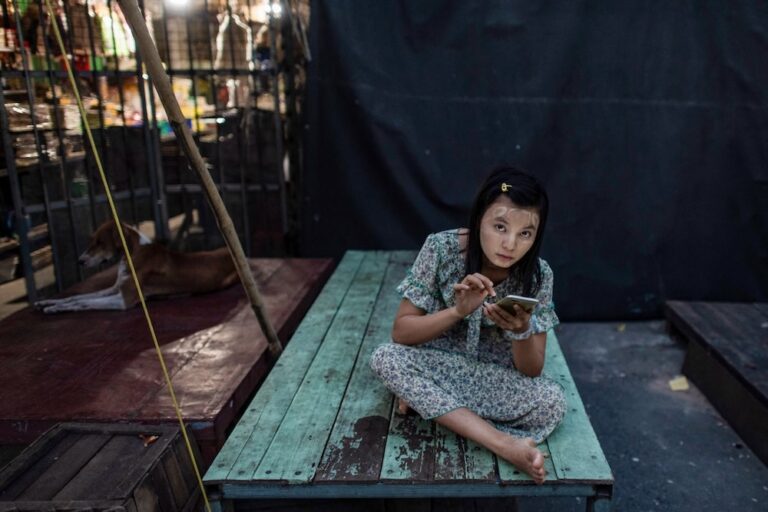(Mizzima/IFEX) – The following is a 17 June 2008 Mizzima News report: Cronyism; unhealthy competition in media market The sustainability of most local media outlets in Burma is now apparently jeopardised not only by the censorship board’s interference but also the unscrupulous approach of military cronies, resulting in an obstruction of the growth of private […]
(Mizzima/IFEX) – The following is a 17 June 2008 Mizzima News report:
Cronyism; unhealthy competition in media market
The sustainability of most local media outlets in Burma is now apparently jeopardised not only by the censorship board’s interference but also the unscrupulous approach of military cronies, resulting in an obstruction of the growth of private media.
Despite the military government’s healthier attitude towards local private media development in recent years, amid the private media’s intense struggle to surge up in a still unfair field of operations, a number of media owners, who are in favour of undue government authority, have come to monopolise the industry.
Burma’s news journal operators, of which there are no more than 12, fall into two broad categories: those who, regardless of the interests of the public, rush to ally themselves with the authorities in order to survive or to dominate the media market, and the other group of operators, who are building their own capacity to be able to compete in the gradually-growing market.
The leading media outlets that are in the first category are few but are strong enough financially to be able to exert undue influence over the censorship board authorities.
“They are few in number, but they are strong financially. They reserve their strength for curbing others’ growth in order to offset fair competition,” said an editor of a recently launched news weekly, adding that they had close relationships with high ranking government authorities such as Brigadier General Kyaw Hsan, the minister for the Ministry of Information, which handles the censorship procedures and grants publishing licenses.
The Press Scrutiny and Registration Division of the censorship board is called Sarpay Kempeitai among Burmese writers and journalists, an allusion to Japanese military police who suppressed and widely committed atrocities on the Burmese independence revolutionaries during the Second World War.
Every article needs to be submitted to the censorship board before publishing. Failure to do so can even result in jail sentences for the media outlet personnel responsible.
For the last five years, media outlets run by cronies of the military have misused the government to suppress the growth of other local media rivals, as they fear fair competition in the growing local print media industry – especially in the weeklies segment, known locally as journals.
“Their positions are more apparent amid increased censorship and personal bias by the Government’s Office of Press Scrutiny along with the domestic political impasse, which also results in limited survival of these businesses, similar to the situation in other business sectors in Myanmar (Burma), due in part to the government’s mismanagement of the country’s business environment,” the editor said.
These media outlets showcase a few comments seemingly critical of government policies in their editorials, but applaud the government in most of the content disseminated. For example, they carried articles to shape the general public’s mindset to follow the government’s so-called seven-step Road Map to democracy.
As well, the demise of a popular weekly journal was said to be linked to crony media outlets’ undue influence over the head of the press scrutiny office, which early this year stripped the weekly’s operating license over a news article it had run despite the censorship board’s denial of permission to do so.
There are several reasons why the “crony” media outlets are in a position to exert that kind of control. Colonel Soe Naing Oo, head of the Office of Senior General Than Shwe, is a major stakeholder of a leading media company (. . .) and used his connections to influence the censorship board.
“(. . .) They make efforts to suppress others’ growth in an early stage of development of the Myanmar news media industry, exploiting their close relationship with the authorities,” the editor said.
Meanwhile, another senior editor who works for a Rangoon-based leading publication said private print media are increasing in number, despite myriad challenges, including the high cost of raw materials, lack of technology and equipment. He points out that quality, rather than quantity, will ultimately determine long-term success, with possibilities in the long run such as media partnerships.
“If we are to look critically at our media, improvements in quality have not necessarily matched increases in quantity. We have a considerable issue here,” he said.
More than anything, to establish a new media company requires deep pockets.
(. . .)
Nevertheless, challenges such as censorship do not hamper capacity building among local journalists. Despite these challenges local journalists are becoming more creative in their professional development. They are working in a unique age that offers them opportunities like training and media fellowships overseas.
(. . .)
In a healthy media environment, the public sector would merely act as a regulatory authority and the private sector would have some measure of independence.
“Especially, the broadcasting sector in Myanmar needs to develop more so the country can enjoy benefits like increased business and employment opportunities, and so the people can get information in a timely manner,” he added.


